Router Comparison: The BIG guide to VPN Routers
How to choose a VPN Router
Choosing a router can be tough, and will often get confusing, with so many options and features available that sometimes it seems like you need a degree in computer science just to understand the specifications. Now, since you’re here, there’s a good chance you’re be wanting to connect to a VPN directly from the router, but if that’s a new concept to you, take a look at our page on why you should use a VPN router, or our VPN service comparison guide. To help you decide which router is a good choice for you, we’ve updated our router comparison guide with a whole load of information on what the different specifications mean and which are the most important when shopping for a router, so you can make the best decision. So which router is best for you?
Let’s jump straight in and take a look at the different options we have available. Click on any of the items in the left column to go to the explanation.
VPN router comparison chart
 |
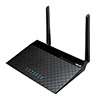 |
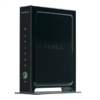 |
 |
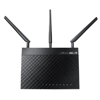 |
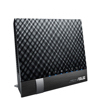 |
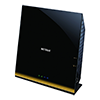 |
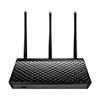 |
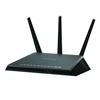 |
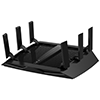 |
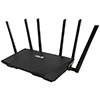 |
| Features (listed below) | Asus RT-N12 | Netgear WNR3500L | Linksys E2500 v3 | Asus RT-N66R | Asus RT-AC56R | Netgear R6300 | Asus RT-AC66U | Netgear R7000 | Netgear R8000 | Asus RT-AC3200 |
| Operating System | Sabai OS | Sabai OS | Sabai OS | Sabai OS | Sabai OS | Sabai OS | Sabai OS | Sabai OS | Sabai OS | Sabai OS |
| Wireless Type | 2.4GHz | 2.4GHz | 2.4 & 5GHz | 2.4 & 5GHz | 2.4 & 5GHz | 2.4 & 5GHz | 2.4 & 5GHz | 2.4 & 5GHz | 2.4 & 2 x 5GHz | 2.4 & 2 x 5GHz |
| RAM | 32 MB | 128 MB | 64 MB | 256 MB | 256 MB | 256 MB | 256 MB | 256 MB | 256 MB | 256 MB |
| CPU | 300MHz | 480MHz | 500MHz | 600MHz | 2 x 800MHz | 2 x 800MHz | 600MHz | 2 x 1GHz | 2 x 1GHz | 2 x 1GHz |
| Chipset | MIPS | MIPS | MIPS | MIPS | ARM | ARM | MIPS | ARM | ARM | ARM |
| USB Ports | 0 | 1 | 1 | 2 | 2 | 2 | 2 | 2 | 2 | 2 |
| Flash Storage | 8 MB | 128 MB | 16 MB | 32 MB | 128 MB | 128 MB | 128 MB | 128 MB | 128 MB | 128 MB |
| Wifi Speed | N300 | N300 | N600 | N900 | AC1200 | AC1750 | AC1750 | AC1900 | AC3200 | AC3200 |
| LAN Ports | 4 | 4 | 4 | 4 | 4 | 4 | 4 | 4 | 4 | 4 |
| Dual Voltage | Yes | No | Yes | Yes | Yes | Yes | Yes | Yes | No | Yes |
| Supports | PPTP/Open VPN | PPTP/Open VPN | PPTP/Open VPN | PPTP/Open VPN | PPTP/Open VPN | PPTP/Open VPN | PPTP/Open VPN | PPTP/Open VPN | PPTP/Open VPN | PPTP/Open VPN |
| Ethernet Cord | Included | Included | Included | Included | Included | Included | Included | Included | Included | Included |
| Ideal for: | Travel | Small Homes | Moderate Traffic | Warm Locations | Network Sharing | SD Streaming | Medium Homes | Large Homes | Gaming | HD Streaming |
| SHOP | SHOP | SHOP | SHOP | End of Life | End of Life | End of Life | SHOP | SHOP | SHOP |
There's a lot of information to follow, we'll do our best to keep it succinct, but in case you want to get some specific knowledge, use the links to navigate the page.
Explanation of router features
Explanation of router features
We understand that a lot of the information in the comparison chart may be new to people who aren't seriously into router hardware, so we'll explain everything you need to know, and answer some of the questions we think people might ask.
OS
The operating system, or firmware, as it's also known, is the software part of the router. A router without an operating system won't do anything at all. Similar to having a computer without Windows/ iOS. We at Sabai Technology have our very own router operating system - Sabai OS - which was carefully designed with privacy in mind, with some great advanced features that are simple to set up and maintain. Sabai OS is installed on our routers as a replacement for the factory firmware, which is often not intended for normal users to tinker with.
Wireless type: 2.4 vs 5GHz
Whether you need your router to broadcast 2.4 or 5GHz WiFi will mainly depend on which devices you want to connect. If you’re mainly using the router for wired connections, using ethernet cables to connect your tv, games console, and PC, for example, and just using wireless for a couple of tablets and phones, then it won’t really make much difference whether your router can broadcast 5GHz. However, if you’re running several network intense devices over WiFi, then it can be useful to have 5GHz available, as it’s usually slightly faster due to having fewer connected devices and is less prone to interference. Check our full post on 2.4 vs 5GHz WiFi
How much RAM does a router need?
The models in our router comparison range from 32MB to 256MB of RAM. With RAM, generally speaking, more is better, but if you’re just using your router for basic web browsing, then lots of RAM isn’t necessary. More RAM does come in useful when you’re running a VPN router with several devices. Sabai OS allows you to connect some devices to the VPN whilst keeping others on the local network (see Gateways). It can also help with Torrent downloads as there are many connections for the router to deal with, as well as gaming if you want to use the internet on other devices at the same time.
How much CPU power is enough?
There’s a lot of conflicting information regarding router CPUs. Many people say that more CPU doesn’t provide a better online experience, but others say the exact opposite. So which is it? Whilst it’s true that for most home applications, a standard router with low CPU is fine, it’s important to remember that if you want to have several devices connected through various configurations of VPN and local internet, then you’ll want higher CPU power. If you’re in a shared house, office, or other location where several devices will be connecting simultaneously, your router’s processing power is certainly something you want to increase.
Even in a normal family home, there could be someone watching Netflix in HD, someone else gaming on a PC, and several phones all connected. A higher CPU power allows you to utilize more high end features such as multi-band connections and VPN, as well as run other devices through the USB ports.
What does the chipset do and which is best out of MIPS and ARM?
The router’s chipset can be thought of as the brain of the router. The type will determine what other hardware is compatible with the router. The chipset combines the router’s CPU and SoC (system on a chip). The SoC holds routing tables in its memory, which determine the best path for delivering packets to their destination. For a really detailed explanation of router chipsets and SoCs, take a look at http://www.tomshardware.com/reviews/router-soc-101,4392.html.
We offer routers with either MIPS or ARM type chipsets, and each has its strengths and weaknesses. The main strength of MIPS over ARM chipsets is price. MIPS are cheaper to produce and therefore make the products they are fitted in slightly cheaper than those with ARM chipsets. On the other hand, ARM chipsets have greater throughput and efficiency, which means they are slightly quicker at solving complex tasks such as encryption. This isn’t the be all and end all of chipset discussion though, as both are designs are used in a broad range of products.
Do I need USB?
This one’s a lot easier to understand. If you want to connect external devices, such as NAS, printers or simply an external hard-drive to allow you to access your storage over WiFi. A USB port also makes it possible to update the router’s firmware via a USB dongle, and you can even use it to charge your phone. A USB port can also be used to connect certain home security systems with CCTV etc.
Flash Storage
Flash storage is where the router's firmware is stored, along with other data such as passwords, cryptographic keys, and user settings. Flash storage can be erased and reprogrammed, which is where the term 'flashing' a router comes from, which means to change the firmware.
WiFi Speed
The maximum speed our routers are capable of is described as either an N number or an AC number. Higher numbers do not mean a longer range, just a higher speed at close range. An N number means the s The N value of the router describes the maximum wireless speed the router is capable of.
LAN
This is the number of wired connections the router can handle. All our routers have 4 LAN ports, meaning you can have 4 devices plugged in using the internet, and still have multiple devices connecting over WiFi
Voltage
This specifies which voltages the unit can run on. In Europe, the main grid electricity runs at 230V, while here in the US, we use 110V. All our routers are dual voltage so they will work in both regions.
VPN Support
This is more the OS’s responsibility than that of the router hardware, although most routers that come from your ISP won’t have any VPN support. All our routers are ready to handle PPTP and OpenVPN. For more info, see our VPN Router setup guide. https://www.sabaitechnology.com/vpn-router-setup/
Router comparisons
Now that you know all about the different options and specs of our routers, let’s put that knowledge to use and find the best router for you. Whether you need a router for travel, gaming, HD streaming, or even a very large home, we’ve got you covered. The following will be split up into sections for budget, mid-range, and top of the line routers. Whichever option you go for, by choosing Sabai OS you’ll be getting a bespoke operating system that allows seamless integration with your VPN, along with easy to set up features, and world-class customer support. Let’s take a look at the routers.
Budget routers
All the routers in this section are in the $144.99 to $239.99 price range, and even at that low price point, are a huge upgrade if you’re currently using the router that came from your ISP. These routers are ideal for those living alone with one or two other people. They will all work with your VPN, and actually offer an outstanding mix of features and value.
Best travel VPN router
Now, it might seem a little strange to take your router with you when you travel, but many hotels now offer wired internet access, which means you can use your router for all your devices, and make sure you’re protected with a VPN when using notoriously insecure internet. What’s more, when you need a bit of down-time, you’ll be able to use the VPN to connect to your home country and enjoy all the content you have access to at home, without worrying about geo-blocking.
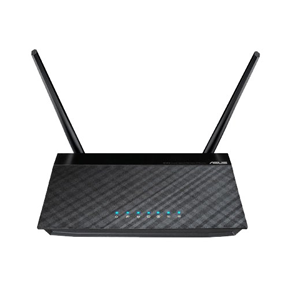
The Asus RT-N12 is a perfect travel companion due to its small size and fantastic value for money. It can provide WiFi speeds of up to 300Mbps at 2.4GHz, and has 4MB RAM. An Asus RT-N12 from Sabai Technology comes with our groundbreaking Sabai OS, which is super easy to set up and use, and ready for taking on the road. It will work with just about any VPN provider , and can be customized to suit your preferences.
Best router for small homes
People who live in small houses or apartments don’t need routers with massive antennas or huge amounts of RAM since most of the users will be pretty close to the device, and there won’t tend to be that many people using it. That being said, it’s always worth upgrading from the terrible router you get when you sign up to an internet contract. Even the most basic routers from us come with Sabai OS, one of the most popular router firmware’s for people who want advanced functionality in an easy to use package.

For small houses or apartments we recommend the Linksys E2500 as it has great specifications for such a low cost router and will serve extremely well those who aren’t too demanding of their internet traffic. This router will easily handle streaming through the VPN, as well as normal gaming, so long as there aren’t too many devices connected at once. To get set up, simply head to our VPN router setup page and follow the instructions.
Best router for moderate traffic
If you’re living in a shared house with a few other people, or have kids who use the internet a lot, you’ll want something a little bit more powerful than what we’ve already looked at. You still won’t need to spend big bucks on your router but you’ll be looking for a bit more RAM and slightly higher CPU power, especially if you plan on using a VPN on your router. Sabai OS is perfect for houses with several people, as you can use our Gateways feature to choose which devices connect through the VPN and which through normal local internet, so you can use the VPN to access geo-blocked content while someone else uses the regular internet to browse Facebook.

The Netgear WNR3500L is an excellent router for moderate traffic thanks to its 128MB RAM and 480MHz processor, which is enough to handle streaming on seperate devices simultaneously and not too network intensive gaming. The USB port also means you can have communal network hard-drive storage, a network printer, or just a handy extra phone charger.
Best router for warm locations
A problem for many people who live in hot climates can be their router getting too warm and running at reduced performance or even worse, stopping altogether. If this is your case, you should consider a slightly lower CPU power and RAM than a very top-of-the-line model.
Asus RTN66U
The Asus RTN66U offers great performance anyway, but will really shine above other models when temperatures soar. It operates on both 2.4GHz and 5GHz, and offers 256MB of RAM with a 600MHz CPU - more than enough for most users. The 2 USB ports allow for easy connecting of a NAS, printer, or a simple hard-drive for network access to files or media.
Best mid-price routers
The following routers offer improved performance and range over a budget router, but at a higher cost. The following routers range in price from $249.99 to $299.99, but deliver excellent WiFi speeds, higher processing power, and more RAM. These routers are for those who want to upgrade from a budget router, or are just looking to get started with a high-quality router that can be used by multiple devices at the same time.
The routers in this section are all great quality pieces of kit, but if you want a top of the line router, take a look here.
Best router for network sharing
If you live in a shared house with several other people, or are going to have plenty of devices connected to your WiFi at the same time, you’re going to need a router with extra RAM and CPU power, especially if you want advanced network features such as a VPN, etc.
Asus RT-AC56R

The Asus RT-AC56R is an awesome router that boasts dual 800MHz processors and 256MB or RAM, which makes this an excellent choice for network sharing. Lots of devices can connect to this router without slowing down the network (providing your actual internet connection is fast enough).
Best router for SD streaming
If your internet service just isn’t good enough to watch HD content, or you just don’t stream a load of HD, then you can save money by getting a mid-range router. If you’re happy with SD streaming, but will still have several devices connected to the WiFi at once, you should definitely check out the Netgear R6300.
Netgear R6300

That isn’t to say this router actually isn’t good enough to stream HD content - it certainly is - but if the people using it are really demanding on the network, you may need to get the next one up. The Netgear R6300 offers excellent features such as 2.4GHz and 5GHz connectivity, along with 256MB RAM and 2*800MHz processors, and works seamlessly with your VPN whilst remaining at a very affordable price. A Netgear R6300 from us comes with Sabai OS preinstalled, making it super easy to get up and running.
Best router for medium sized homes
People living in medium sized homes will generally be looking for a good mix of range and features at a reasonable price. More devices connecting to WiFi requires extra RAM, but many households won’t need huge processing power unless there are several gamers in the house. For this reason we suggest the Asus RT-AC66U for medium sized homes.
Asus RT-AC66U

The 600MHz CPU is quick enough to encrypt and decrypt quickly when using a VPN, and the 256MB of RAM means several devices can connect to the WiFi without losing speed. On top of that, this router operates on both the 2.4 and 5GHz channels, giving plenty of signal for a wide range of devices.
Top of the range routers
If none of the above routers meet your need for top specifications, the following are some of the best models on the market right now. For this level of performance you do have to pay a bit more, but for the most demanding gamers, streamers, or those with many users, these routers are unmatched. Effortlessly route multiple devices through your VPN with no loss in performance, create gateways to choose which devices use the VPN, and set up extra access points or even a VPN accelerator to get the very best connection even in very large homes.
Best router for large homes
If you live in a large home with a garden and multiple bedrooms, you’ll want a WiFi solution that will serve all areas to multiple devices all connecting at once. You’ll need high-quality power amplifiers with antennas to make sure everyone gets a good signal, and plenty of CPU power, especially if various devices will be using the VPN to encrypt internet traffic and avoid geo-blocking. Allow me to introduce the Netgear ‘Nighthawk’ R7000, our most popular router.

This beast of a router has 256MB of RAM, and works on both the 2.4 and 5GHz WiFi channels, so loads of devices can connect without any worry of lowered performance. Add to this the two 1GHz processors, and you’ll experience lightning fast VPN connections that you couldn’t even dream of with your ISP provided router. 2 USB ports allow the connection of a NAS system, a printer, or a simple hard-drive for network storage, and the 4 LAN ports allow you to keep static devices such as TVs, games consoles, and network streamers plugged in all the time, freeing up bandwidth for even more wireless devices.
Best router for gaming
If you live in a house with several avid gamers and you want the very best router for gaming, look no further than the incredible Netgear R8000, Netgears flagship router, designed for gamers, streamers, and anyone who wants a flawless internet experience. Whether you’re using a console through a LAN connection, or even connecting wirelessly through the router’s VPN, the R8000 provides an incredibly fast internet connection, guaranteeing near zero latency.

This amazing gaming router has 2 1GHz processors that allow for lightning fast encryption and decryption when using the VPN, along with 256MB RAM and 3.4 and 5GHz WiFi capability, making this an awesome router for anyone who needs the highest quality connection even when other people are using the WiFi. This a truly top of the range router that is perfect for gaming and definitely won’t disappoint.
Best router for HD streaming
Now we come to the final offering in our router comparison, and since you’ve got this far, you must really be looking for the very best router available. Congratulations, you’ve found the enormous, 6 antennaed beast known as Asus RT-AC3200. Whilst there’s not a huge difference in power or speed between this and the Netgear R8000, the Asus just feels slightly more substantial than the Netgear.

Now, most people probably won’t need the extra chunkiness of the Asus, but for those who really want the top of the line router, that will never let them down, then the Asus RT-AC3200 can’t be beat.
A final word on the routers we’ve compared
If you’ve read this far, you’re well on your way to being a router expert. If you were already a router expert, I hope you’ve at least found the comparison of different router specifications useful.
Router comparison can be a very broad topic, and there will always be disagreements about which is 'best', but we've created this guide to help you get a better idea of what it is you should be looking for in a router. In the end hardware quality and specifications are often more important than a brand name. Once you’ve chosen your perfect router, take a look at our setup guides, and our VPN comparison page to see how different VPN companies stand up when paired with a Sabai router.
